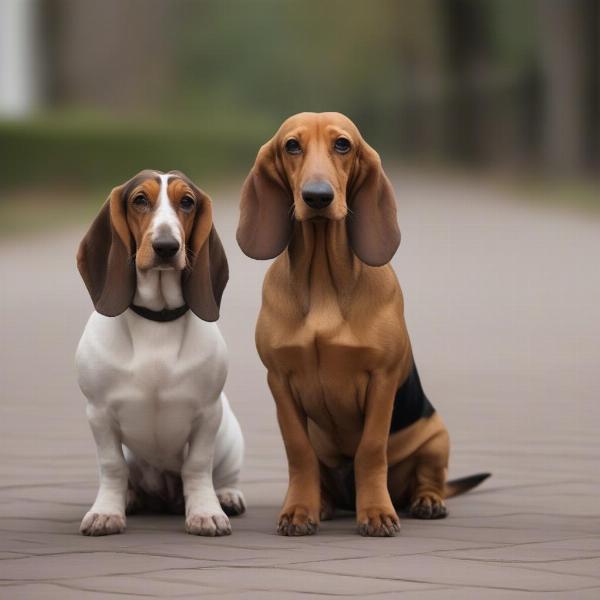The term “longue dog” isn’t a recognized breed name. It’s likely a misinterpretation or misspelling of a French breed name, perhaps “chien longue,” which translates to “long dog.” This could refer to several French breeds known for their elongated bodies, like the Basset Hound or the Dachshund. This article will explore some possibilities and provide insights into these fascinating breeds, focusing on their care, characteristics, and what makes them unique.
Possible Breeds Behind the “Longue Dog” Search
Several French or French-related breeds might be what someone searching for “longue dog” is looking for. Let’s delve into some of the most likely candidates:
-
Basset Hound: Known for their droopy ears, short legs, and long body, Basset Hounds are scent hounds originally bred for hunting small game. Their laid-back personalities make them beloved companions, but their stubborn streak can make training a bit challenging.
-
Dachshund: Also known as the “sausage dog,” Dachshunds have a long, low-slung body and short legs. They were bred to hunt badgers and other burrowing animals. These energetic and playful dogs can be prone to back problems due to their unique physique.
-
Grand Basset Griffon Vendéen: Another scent hound, the Grand Basset Griffon Vendéen, has a longer body and slightly longer legs than the Basset Hound. They are known for their rough coat and lively, independent nature.
 Basset Hound and Dachshund Comparison
Basset Hound and Dachshund Comparison
Caring for a “Longue Dog”
Regardless of the specific breed, caring for a long-bodied dog requires attention to their unique needs:
-
Back Health: Due to their elongated spines, breeds like Basset Hounds and Dachshunds are prone to intervertebral disc disease (IVDD). Supporting their back by avoiding stairs, jumping, and obesity is crucial.
-
Exercise: While they might not be marathon runners, these breeds still need regular exercise to maintain a healthy weight and prevent back problems. Short walks and playtime are usually sufficient.
-
Grooming: Depending on the breed’s coat type, grooming requirements vary. Basset Hounds require minimal grooming, while the rough coat of a Grand Basset Griffon Vendéen needs regular brushing.
-
Training: Positive reinforcement methods work best with these breeds. Patience and consistency are key, especially with the sometimes stubborn Basset Hound.
Temperament and Personality
Long-bodied dogs are known for their unique personalities:
-
Basset Hounds: Gentle, affectionate, and laid-back, but can be stubborn.
-
Dachshunds: Playful, energetic, and courageous, but can be prone to barking.
-
Grand Basset Griffon Vendéen: Lively, independent, and affectionate, but can be challenging for first-time owners.
Choosing the Right “Longue Dog” for You
If you’re considering a long-bodied breed, research is crucial. Consider your lifestyle, activity level, and experience with dogs. Each breed has unique needs and characteristics.
Conclusion
While “longue dog” might not be an official breed name, it likely points to a fascinating group of French and French-related dogs known for their elongated bodies. By understanding their specific needs and characteristics, you can choose the perfect “longue dog” companion for your lifestyle and provide them with a happy and healthy life.
FAQ
-
Are “longue dogs” good with children? Some, like Basset Hounds, are known for their gentle nature with children. Others, like Dachshunds, might be better suited for older children due to their energetic nature.
-
What health problems are common in “longue dogs”? Back problems, like IVDD, are a concern, especially in Dachshunds and Basset Hounds.
-
How much exercise do “longue dogs” need? Moderate exercise, like short walks and playtime, is sufficient.
-
Are “longue dogs” easy to train? Training can be challenging due to their sometimes stubborn nature. Positive reinforcement is crucial.
-
What is the lifespan of a “longue dog”? Lifespan varies depending on the specific breed but generally ranges from 10-15 years.
-
Are “longue dogs” good apartment dogs? While some can adapt to apartment living, their need for exercise should be considered.
-
Do “longue dogs” bark a lot? Some breeds, like Dachshunds, are known to be vocal.
ILM Dog is your trusted international resource for dog care and breed information. We specialize in providing expert advice on Dog Breeds and Selection, Health and Medical Care, Training and Behavior, Nutrition and Feeding, Grooming and Hygiene, and Products and Accessories. For personalized guidance and support on finding the perfect dog for you, contact our expert team at [email protected] or call us at +44 20-3965-8624. Learn more about our services and resources at ILM Dog.